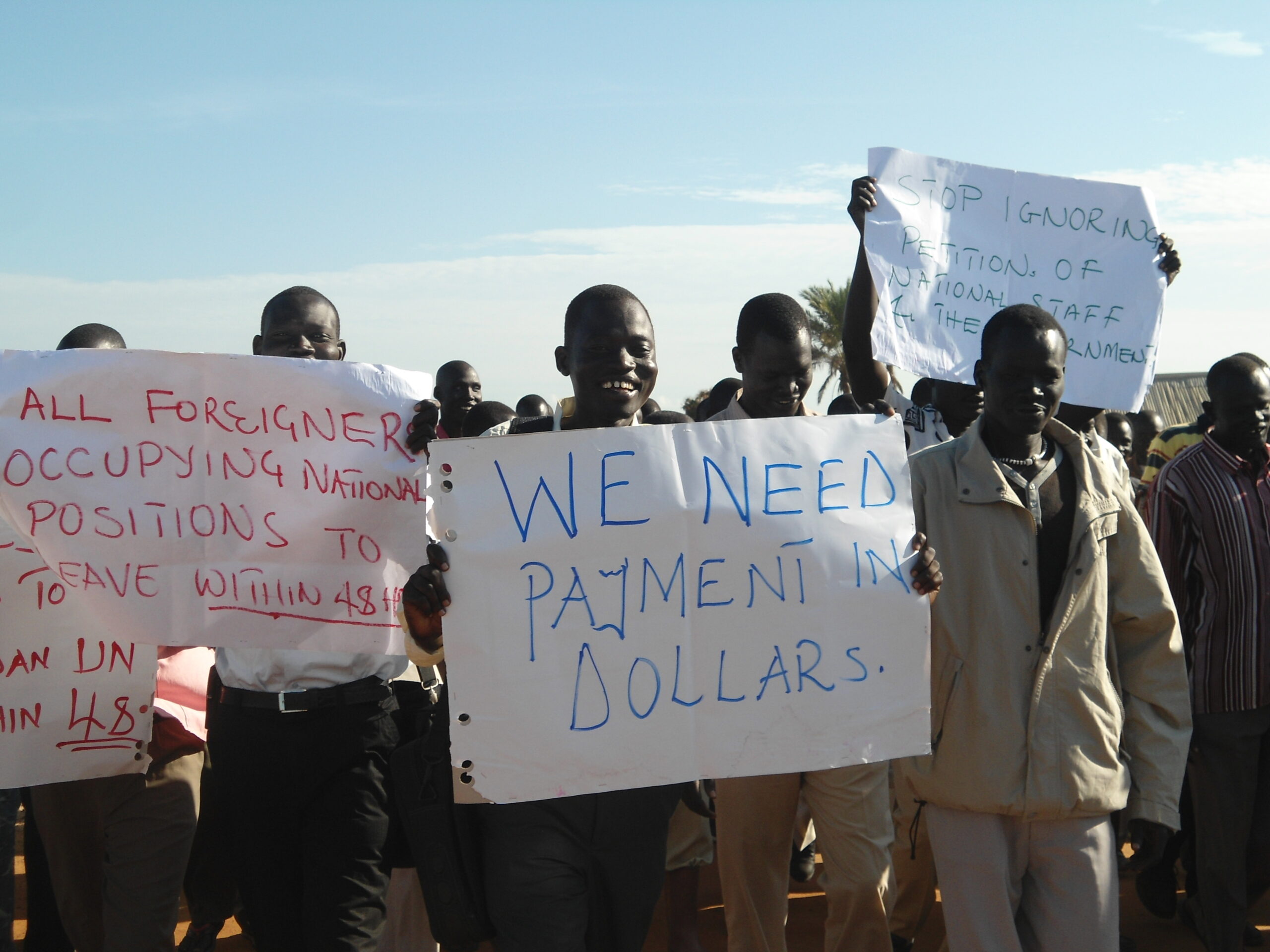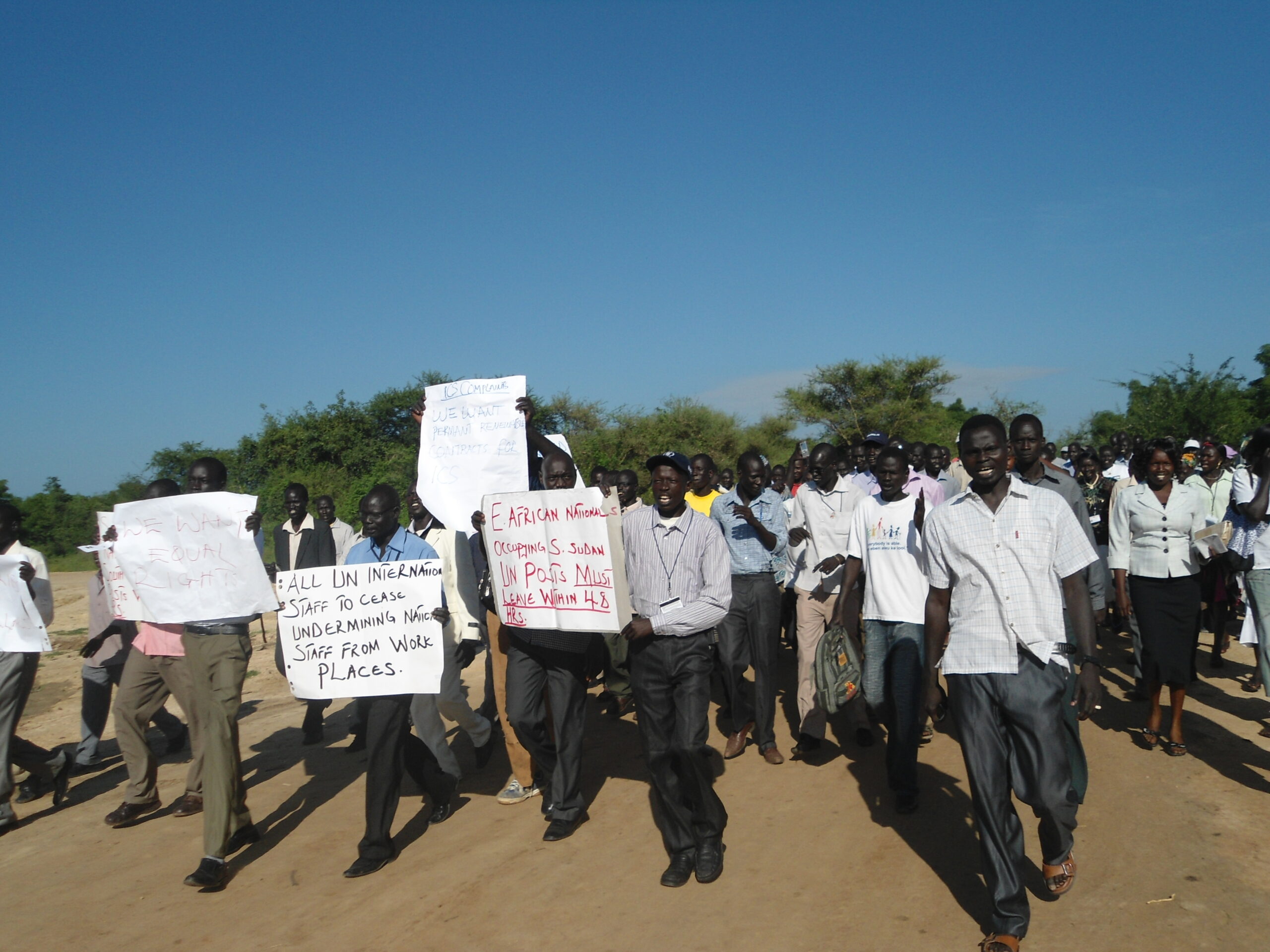South Sudanese UN staff strike over pay and working conditions
August 13, 2012 (BENTIU/BOR/RUMBEK) – Hundreds of South Sudanese United Nations staff across the young nation went on strike Monday demanding that they are paid in US Dollars rather than South Sudanese Pounds, which have decreased in value due to high inflation since the turn of the year. The demonstrators also demanded that international staff are removed from positions that are supposed to be filled by national staff.

According to a letter from the National Staff Federation (NSF) seen by Sudan Tribune last week, South Sudanese UN staff have been asking to be paid in dollars, like their international counterparts, since 2009 and have not received a salary review or increment since South Sudan’s independence last year.
The protestors are demanding that their August salaries is paid in US Dollars. NSF representatives are expected to meet with the UN leadership in Juba this week to try and resolve the dispute.
Food price have doubled in many areas of South Sudan in recent months and fuel has increased by over 300 percent in some towns.
On 26 May South Sudan’s Ministry of Labour and Public services wrote a letter to the country’s many UN agencies and international non-governmental organisations (NGOs), copying in the Ministry of Finance, demanding that local staff are paid in dollars.
An oil dispute between Juba and Khartoum led to the stoppage of South Sudanese oil production in January depriving the government of 98% of its income and triggering a economic crisis in the young nation. Oil exports were the main source of hard currency, causing a shortage of dollars further weakening the value of South Sudanese Pound (SSP).
South Sudan relies heavily on imports, mainly from Kenya and Uganda, for which hard currency is essential.
The United Nations Mission in South Sudan (UNMISS) was created after South Sudan seceded from Sudan in July 2011 replacing the UN Mission in Sudan, whose mandate was not extended at the behest of Khartoum.
Living cost in many areas near the new international border have also increased as the Sudanese government has closed the border for trade for over a year due to security issues.
BOR PROTESTS
In Bor, the capital of Jonglei State, hundreds marched to UNMISS compound to demand that they be paid in dollars. Basilica Paul, a UNHCR employee speaking on behalf of the protestors Bor said: “We have only two points; the first is payment in dollars. Secondly all foreigners who are occupying national posts should vacate the posts within 48 hours”, said Paul.

In the UN system there are national professional contracts, (classified as GL-5, GL-6) which are supposed to be occupied by South Sudan Nationals but protestors claimed that some international staffs from East Africa and Sudan have been employed to occupy some of these posts.
Paul also alleged that national staffs were discriminated against by their international counterparts but did not give specific examples. “We don’t want discrimination. This is discrimination against UN staffs. If you [the UN] are preaching about non-discrimination,” she continued.
The UNMISS coordinator in Jonglei State, Guang Cong, warned the protestors to keep roads open for free movement of UN vehicles, promising that the their complaints will be addressed soon, warning the protestors against resorting to any sort of violence.
No violent incidents have been reported and organisers made it clear that the demonstration should be orderly and peaceful.
Cong said: “I do hope personally that this issue can be sorted out as soon as possible”, inserting that “apparently this is something behind the authority of [Hilde Johnson the Special Representative of the United Nations Secretary General] so we need to have final approval from New York”.
The also protestors rejected temporary individual contacts,(ICs) and asked for permanent ones, adding that they will not report to their offices till the two grievances are solved. “With individual contracts, you can be terminated any time even slight slip-up”, one of the protestors added.
The minister of Labour, Public Service and Human Resource Development, Racheal Nyadak Paul, who issued a circular last month to UN offices in Jonglei instructing them to pay their employees with hard currency, said her ministry both the national and state levels saw the unfairness within the pay schemes of the UN, unfairly disadvantaging local staff.
One dollar buys SSP 5.7 from Bor’s black market exchange dealers and SSP 4.7 in banks. The decrease in value against the dollar has put local staff at a considerable disadvantage, protestors say..
According to Nyadak, the South Sudan government plans to introduce a law instructing all UN agencies to pay staff in hard currency.
“They have been advocating for human rights. Why are they discriminating their staff?”, said Nyandak, adding that the UN was obligated to treat South Sudanese staff equally especially considering South Sudan’s economic crisis.
UN workers where finding it increasinly hard to send money to their families in other parts of East Africa, due to the decrease in value of the South Sudanese Pound.
UNITY DEMONSTRATION
Bordering the closed border with Sudan, Unity State has been one of the worst effected by inflation on food and fuel, and in Bentui around 150 UN workers joined the demonstration. Local staff marched 30 kilometres from the UNMISS compound to the centre on town on Monday morning.
Glady Nyamai a community social worker for UNHCR said their demands must be met so they can cope with increasing prices and be able to pay school fees.
“It is hard finding dollars in the local market”, she added.
South Sudanese staff said that as the money came in hard currency from New York and Geneva there was no reason to transfer it into SSP before paying local staff.
Some NGO’s in Unity State like World Vision and Care International have already implemented the recent request from government to pay local staff in dollars.
Pathot Henry Diew, another UN worker said that as many NGOs paid staff in hard currency, he did not understand why UN could not also. Diew dismissed as “propaganda” allegations from some other national staff that they are mistreated by their international counterparts.
The Security Advisor to Unity State’s Governor, Manyiew Dak, said he agreed with Monday’s demonstration and their demands.
“We have receive this letter and will immediately forwarded to the state government for discussion and soon the result will be out for your peaceful demonstration”, he told the demonstrators at the governor’s office.
RUMBEK
In a peaceful demonstration in Rumbek, the capital of Lakes state, the leader for National Staffs Association (NSA) in Rumbek handed over a memo to Lakes state UN team site state coordinator Renuka Chidamdarm asking her to present their memo to the bodies leadership in Juba and New York.
In response, Chidamdarm said that the UN leadership is being notified over the demands but could not say whether they would be met.
“I have received your memo and New York is aware of you demand – we need you to go back to your offices otherwise you will be paid with half day at end of August. We will be follow up with New York as you are working” said Chidamdarm.
Lakes State Governor Chol Tong Mayay, stated that he had received national staff’s document informing all state government’s about their peaceful demonstration, adding the was awaiting the UN’s response.
“In my meeting today with UN state coordinator, I learned from her that the UN in South Sudan is supporting national staffs demand but New York” had not yet approved that they are paid in dollars.
He said the Lakes state government expected that national and international be treated equally, including being paid in the same currency. He also asked that non-Sudanese filling position stipulated for local staff should leave.
Lakes State Chairperson for National Staffs Association (NSA), Intelligent Lovarick, who lead the protest in Rumbek said the UN should take not of the protest. Lakes State’s peaceful demonstration was held under the theme “Sit down from work”.
(ST)
